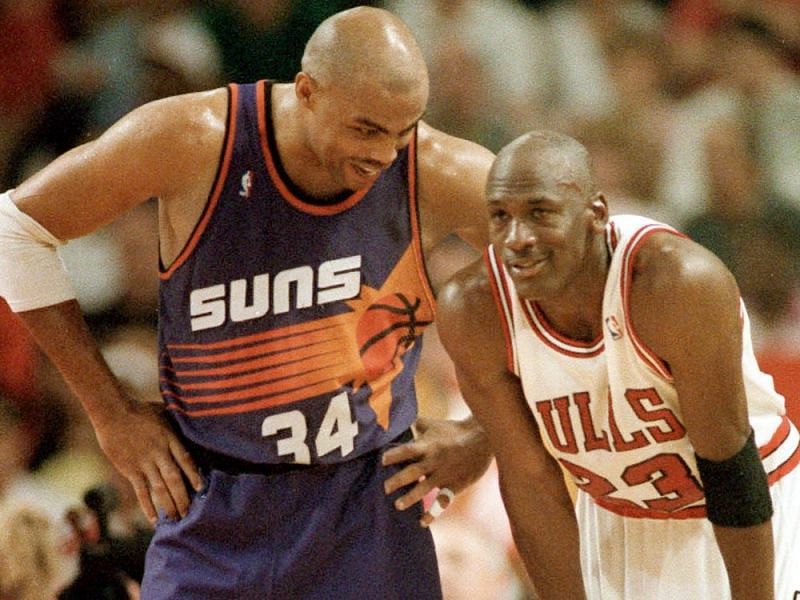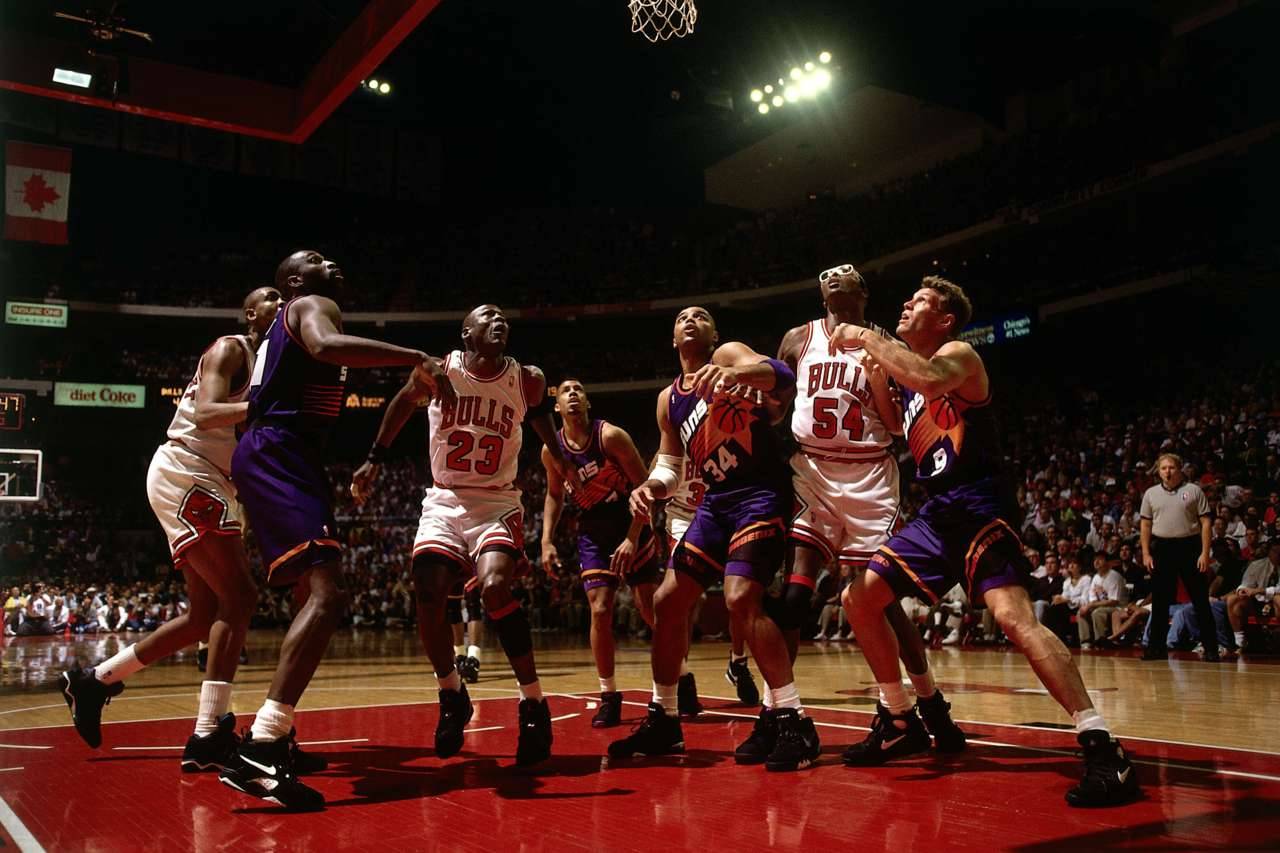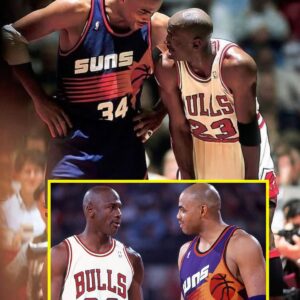The Night Charles Barkley Realized He Wasn’t the Best: A Painful Truth from the 1993 NBA Finals

Phoenix, Arizona— For a fleeting moment in 1993, Charles Barkley stood atop the basketball world. He was the NBA’s Most Valuable Player, the face of a rejuvenated Phoenix Suns franchise, and—at least in his own mind—the best basketball player alive. But fate, and Michael Jordan, had other plans.
This is the story of how one of the NBA’s greatest competitors faced his most crushing defeat—not just on the scoreboard, but in his own heart.
A New Beginning in the Desert
Charles Barkley’s journey to the 1993 NBA Finals began with a trade that shocked the league. After years of frustration in Philadelphia, Barkley landed in Phoenix, welcomed by a city hungry for basketball glory. The Suns were loaded with talent—Kevin Johnson, Dan Majerle, and Tom Chambers—but it was Barkley’s arrival that transformed them from contenders to favorites.
Barkley wasted no time making his presence felt. He dominated the regular season, averaging 25.6 points, 12.2 rebounds, and 5.1 assists per game. His fiery leadership and relentless energy electrified the Suns and earned him the league’s MVP honors, breaking the stranglehold Michael Jordan had held on the award.
“I told Coach Cotton Fitzsimmons, ‘We’re going to the Finals. I’m the best basketball player in the world,’” Barkley would later recall. “He said, ‘Well, Michael’s gonna be there.’ I told him, ‘I think I’m better than Michael Jordan.’”
For Barkley, this wasn’t bravado. It was belief. And for the first time, the path to a championship seemed clear.
The Showdown: Barkley vs. Jordan
The 1993 NBA Finals were billed as a clash of titans. On one side, the defending champion Chicago Bulls, led by Michael Jordan, the game’s ultimate assassin. On the other, the upstart Suns, with Barkley determined to prove he was the new king.
But the series began with heartbreak. The Suns dropped Game 1 at home, a devastating blow. Game 2 became a must-win—a test of Barkley’s greatness.
He responded with a performance for the ages: 42 points, 13 rebounds, and 4 assists. Barkley attacked the rim with ferocity, hit mid-range jumpers, and willed his team back from every deficit. The Suns faithful roared as their MVP put on a clinic.

But on the other side, Michael Jordan was watching—and waiting.
Jordan matched Barkley, shot for shot, moment for moment. He poured in 42 points, grabbed 12 rebounds, and dished out 9 assists. When the final buzzer sounded, the Bulls had edged the Suns 111-108. Chicago led the series 2-0.
Barkley was devastated. He’d played one of the greatest games of his life—and still lost.
A Private Defeat: Barkley’s Darkest Night
The pain didn’t hit Barkley immediately. It crept in later that night, as he returned home to his family, the cheers of the crowd replaced by an unbearable silence.
“I got home that night and my daughter was crying,” Barkley remembered in a later interview. “She said, ‘Dad, y’all lost again.’ I said, ‘Baby, I think Michael Jordan’s better than me.’ She said, ‘Dad, you’ve never said that before.’ I said, ‘Baby, I’ve never felt like that before.’”
It was a moment of raw honesty from one of basketball’s most confident men. For the first time, Barkley admitted what so many greats of his era had to accept: Michael Jordan was simply on another level.

The Series That Changed Everything
The rest of the Finals played out in dramatic fashion. The Suns battled back, taking Game 3 in triple overtime. Barkley continued to fight, averaging nearly a triple-double for the series. But Jordan was relentless, averaging an astonishing 41 points per game—the highest ever in an NBA Finals.
In Game 6, with the Suns clinging to a late lead, John Paxson’s three-pointer sealed the Bulls’ third straight championship. Barkley, exhausted and heartbroken, watched as Jordan once again climbed the mountaintop.
Barkley never made it back to the Finals. The Suns would remain contenders, but the window had closed. For Barkley, the 1993 Finals became a defining moment—a reminder that sometimes, even your best isn’t enough.
The Weight of Greatness
For years, Barkley’s duel with Jordan haunted him. He’d beaten every other star of his era—Karl Malone, Patrick Ewing, Hakeem Olajuwon—but not Jordan. In the decades since, Barkley has spoken candidly about the pain and the respect he gained for his rival.
“Michael was just better,” Barkley has often admitted. “I never felt like that before. I thought I was the best. But he was something else.”
It’s a sentiment echoed by countless legends—Reggie Miller, Charles Oakley, Clyde Drexler—each forced to reckon with Jordan’s brilliance.

A Lesson for Every Competitor
Barkley’s story is more than a tale of defeat. It’s a testament to the pursuit of greatness, the agony of falling short, and the humility required to acknowledge a worthy adversary.
In a sports world obsessed with winning, Barkley’s honesty stands out. He didn’t hide from the truth. He faced it, learned from it, and—ultimately—became a better man because of it.
Today, Barkley is beloved as a broadcaster, his wit and candor making him a fan favorite. But for those who remember 1993, he’ll always be the MVP who dared to challenge the greatest—and had the courage to admit when he was beaten.
The Shadow of the GOAT
For Charles Barkley and a generation of NBA stars, Michael Jordan was more than a rival—he was an immovable obstacle, the final boss in a game where only one could win.
Barkley’s journey reminds us that greatness isn’t just about championships. It’s about the battles fought, the lessons learned, and the respect earned—sometimes in defeat.
Because sometimes, no matter how great you are… Michael Jordan is on the other side. 🐐🔥

Leave a Reply